Chef Pino Cuttaia – two Michelin stars with his La Madia in Licata – once made us notice how the homely and domestic food par excellence, lasagne, should in fact be considered a luxury food and be given – even financially – a very different value, considered the number of professions involved, what with fresh egg pasta, ragù sauce, bechamel, parmigiano and tomato sauce. The farmer who raised the hens, to get the eggs; the labourer who reaped the wheat, the miller, the breeder who looked after his cows and milked them, the dairy producers who made butter and parmigiano from that milk, the butcher who selected the best cuts. We believe this same approach can be applied to another comfort food par excellence, that is to say burgers – which also have a layered soul, like lasagna – and this applies, without any doubt, to the hamburguesas gourmet that Mauro Colagreco, patron at Mirazur in Menton, 3 Michelin star since 2019 and now best chef in the world according to The 50 World’s Best Restaurant 2019, presents in a chain of burger restaurants called CARNE, in his “amada Argentina”.
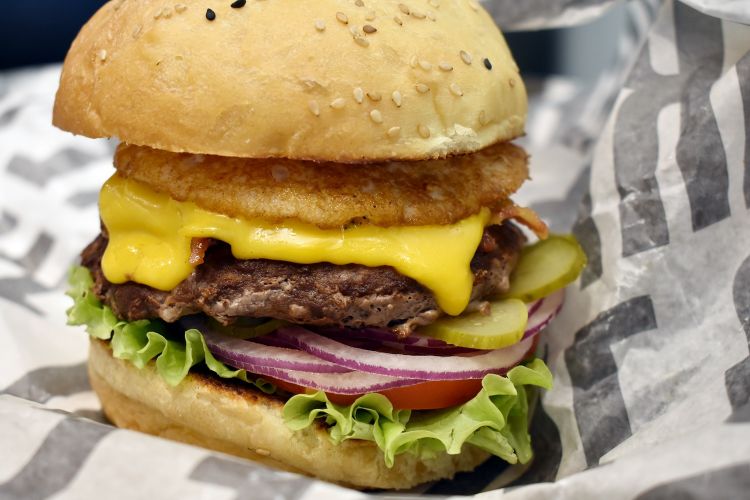
Hamburguesa Completa: artisanal bread, organic tomato, onion and lettuce, free range meat, artisanal cheddar, eggs from free range farm hens, pancetta from pigs raised with no antibiotics and no hormones, cucumbers pickled on the same day they were picked. Nine luxury ingredients
In this sense, one of the goals of CARNE is indeed to redefine the concept of luxury, applying fine dining principles to an accessible and mass market food. It was conceived and designed, from the start, as a fast food chain – that is to say a series of restaurants offering simple and fast food in terms of preparation and fruition –CARNE’s concept is not about unusual pairings, exclusive ingredients or experimental cooking systems. But in the meticulous choice of every ingredient, every supplier, and of the way in which each element is produced, following extremely high-quality standards, respecting the pillars of sustainable gastronomy, and in the hope of promoting a change of paradigm in food production. When we choose what to eat, we choose how we want to live. Eating, in this sense, is a political act. Choosing how to produce a food – or support the way in which it is produced – is even more of a political act, given the impact it generates on a large scale.
With this vision in mind, in January 2016, Mauro started this entrepreneurial adventure in his hometown, La Plata, with his sister Carolina who welcomes us in CARNE’s third branch, opened in 2017 right in the centre of Buenos Aires, a short walk from Casa Rosada, in San Telmo.
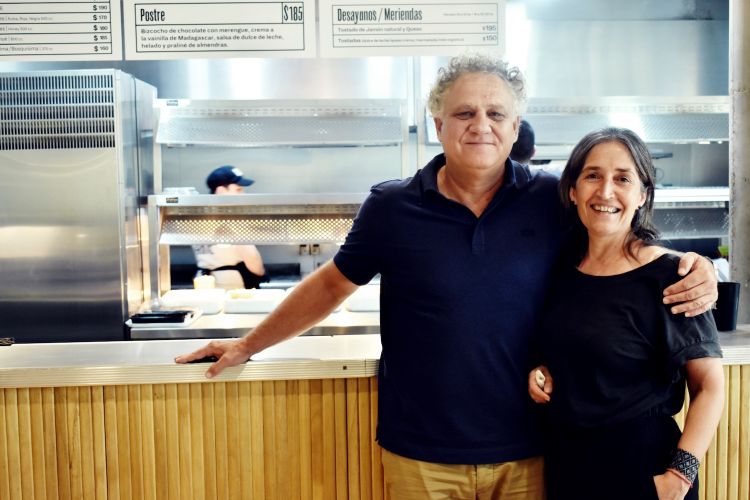
Carolina Colagreco and her husband Rafaél Lima, president at CARNE
«We are strongly convinced that it is necessary to reconsider the way in which large scale food products are presented –
Carolina explains -
Mauro has always been aware of the role and the impact that fine dining can have with regards to the themes that trouble humanity: agriculture and breeding make for 80% of global production and feed the food industry which has a huge social, environmental and economic impact on a global scale. So, if we could transform and rethink the rules and principles that regulate these sectors, the resulting impact would be remarkable and would influence two among the most urgent problems of humanity: hunger and the environment».
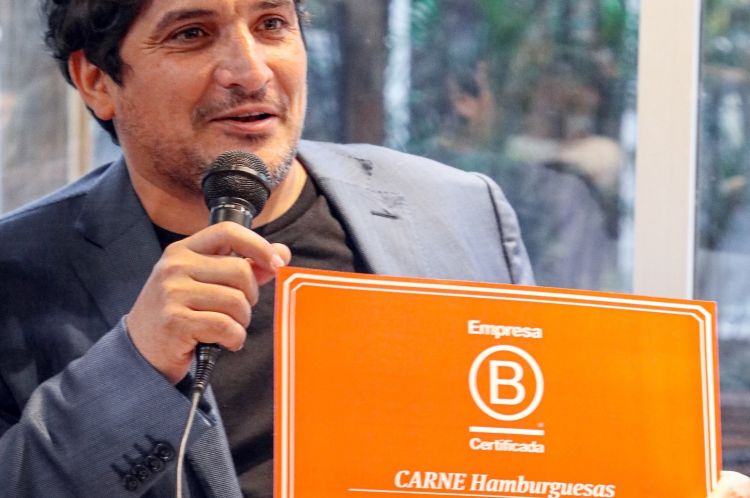
Mauro Colagreco with the Empresa B certificate, which acknowledges CARNE’s triple positive impact: economic, social and environmental
The ethical inspiration behind this company philosophy is summed up in the motto “
Not to be the best company in the world, but the best company for the world”.
CARNE’s journey has just begun but it has already received the
Empresa Bcertification in November 2019, which awards companies with a triple impact: economic, social, environmental. The acknowledgement was given by an American non-profit organisation called
B Lab, after countless controls, certifications and inspections. Only 3K companies around the world have the
Empresa Bcertificate, and only one of them is a burger chain, and is in Argentina.
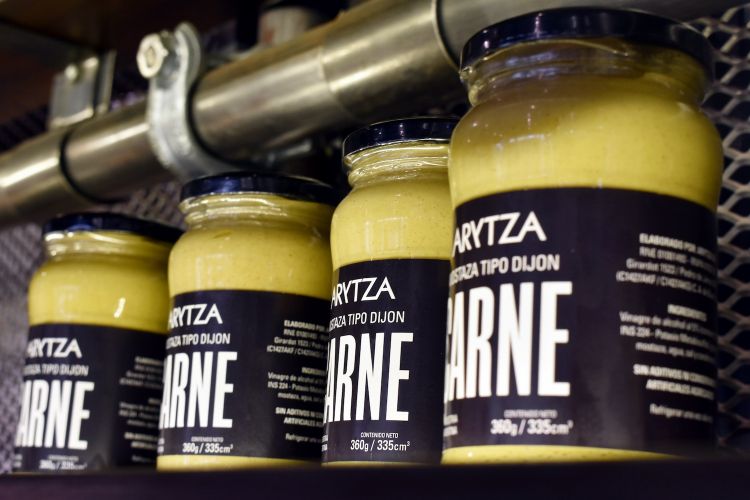
The artisanal Arytza mustard, from agroecological ingredients, made without artificial additives and preservatives
The method to bring ethics, social commitment and safeguard of the environment into the kitchen firstly and mostly is a matter of choice: of products and of producers, which
Colagreco, in each one of his projects, always gives importance to. The proof of this is in the name of his tri-starred dishes at Mirazur such as
Anne-Marie Curti lamb, chanterelle mushrooms, lemons confit, wild celery, coffee. Or
Marie Le Guen pigeon, cabbage, red wine sauce. In both cases, the name of the producer is included in the name of the dish.
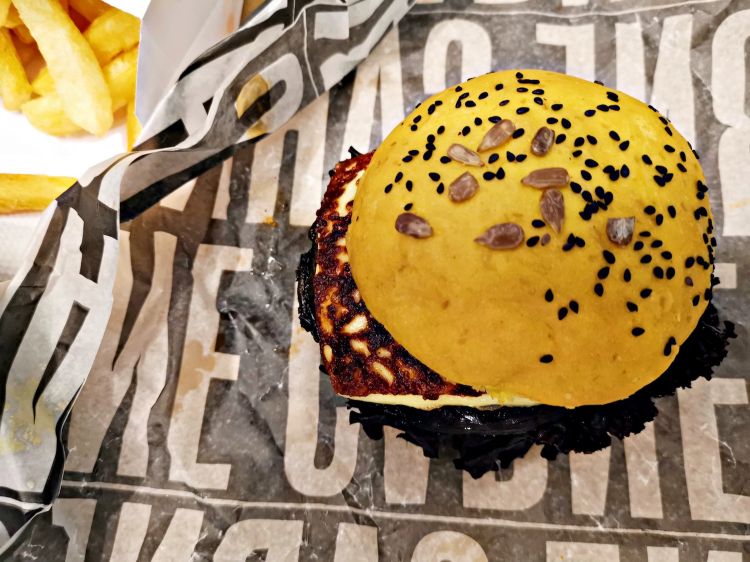
Hamburguesa vegetariana with cheddar and mushrooms, turmeric bread with sunflower seeds and black sesame seeds, made by Sebastián Perez in his artisanal laboratory El Arrobo, Panadería & Compañía
At
CARNE suppliers also have their name stated. The bread, for instance, is made each day by
Sebastián Perez in his artisanal laboratory
El Arrobo, Panadería & Compañía in City Bell, 10 km from La Plata, with no additives nor preservatives. This choice has a double value: qualitative and social. «Today in Argentina bakeries risk extinction. Bread is no longer made in bakeries, like when we were kids. It’s turning more and more into an industrial product –
Carolina Colagreco explains – The know how that is transferred through professions has a cultural value and we’re trying to protect this choice», which naturally implies a growing awareness of the type of flour used (they’re currently experimenting the production of their own organic wheat, which they will mill in their own mill).
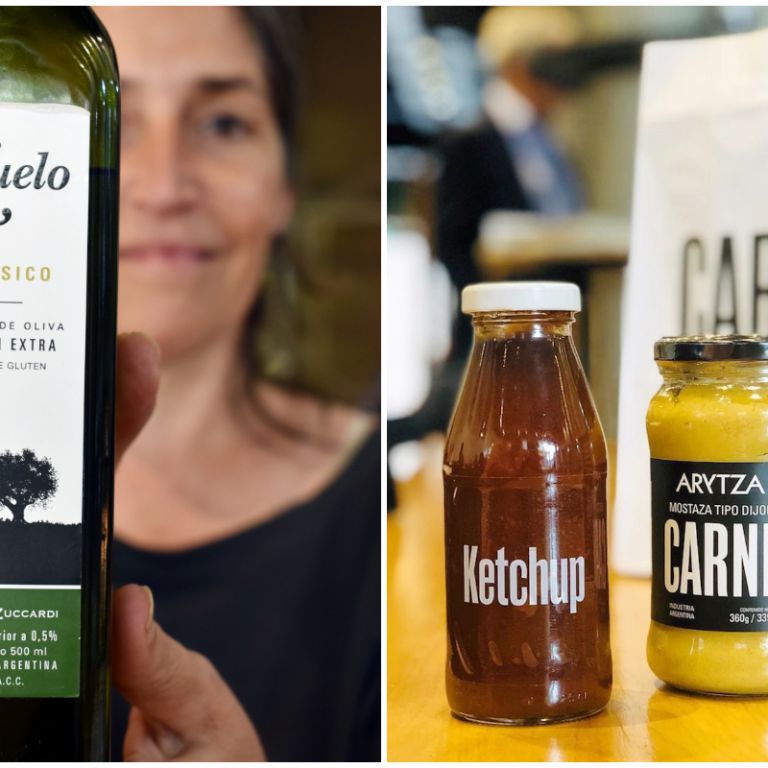
To the left, Carolina Colagreco and Zuccardi’s Zuelo oil, one of the luxury ingredients used in Colagreco’s fast-food chain. To the right, the artisanal ketchup made by Guillermo Frusto at PampaGourmet with agroecological tomatoes. While the Dijon mustard is made by Leo Merlo’s Arytza. Both have no chemical additives and preservatives
There’s more: there are 25 varieties of tomatoes used at
CARNE (there were 6 in the salad we tasted, perfectly matched by slices of white and yellow peaches, almonds, red and green basil, flakes of unrefined salt from the coast of Chubut, in the Argentinian Patagonia), made by cooperatives of landless farmers, with no chemical products and with seeds free of copyright. Tomatoes that can be found in the burgers or salads only in the summer, and which in the winter are replaced by
tomates de invierno, “winter tomatoes”, that is to say preserved tomatoes made by the farmers from
Manos del Pueblo in Mendoza. Seasonality, biodiversity, use of organic products, support of local communities and of food sovereignty; all this simply behind the choice of ingredient and producer.
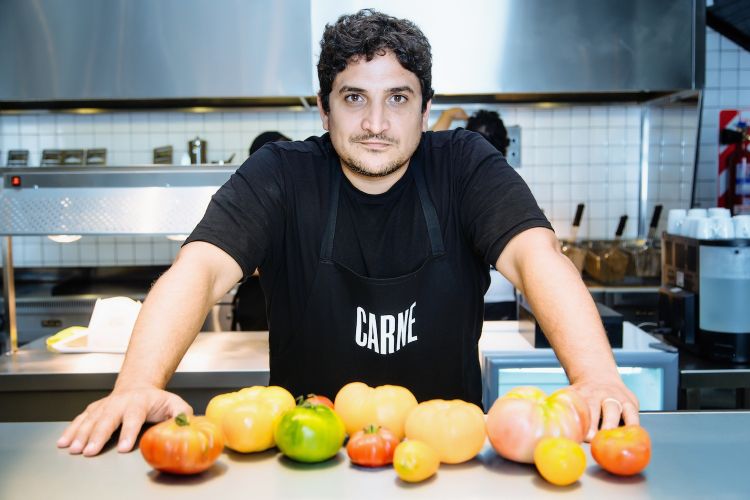
At CARNE they use as many as 25 varieties of tomatoes, in the name of flavour and of the preservation of biodiversity
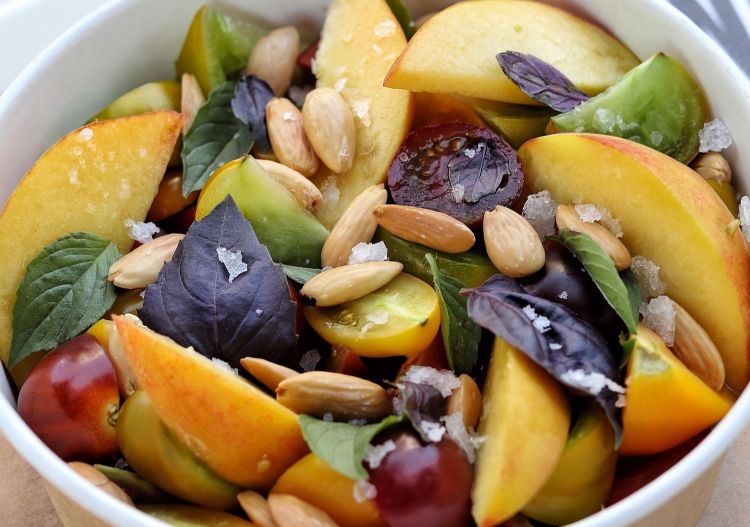
Salad with six varieties of tomatoes, white and yellow peaches, green and red basil, toasted almonds and flakes of unrefined salt from the Argentinian Patagonia
Then of course there’s meat, which in a burger, and from Argentina too, is of course the main character. The burgers are made only from free range cattle, something not to be given from granted given that feedlot is becoming popular in Argentina too, where in fact traceability is not as regulated as in Europe: «The free range and the feedlot animals enter from two separate doors –
Carolina told us – but exit from the same door». The
Colagrecos had to ask their supplier to follow tailor-made system of traceability, so as to be sure of the origin and the quality of the meat they use: no antibiotics, no intensive breeding, only free range.
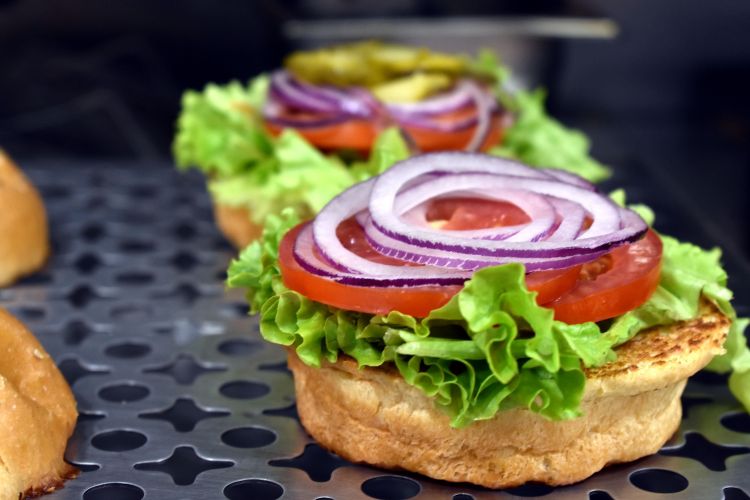
In the making – simple but luxurious ingredients. "The greatest Wealth is Health", as the American say
: a name and a concept that might sound clashing, or at least controversial to many, when speaking of the health of people and of the planet. Not to mention those who might see a lack of coherence from a chef who in his starred restaurant offers a cuisine that many define as “vegetal” and who, in a recent interview, pointed out that we must urgently reduce our consumption of meat. In fact, there is no contradiction and
Mauro Colagreco explained so himself: “At
CARNE we don’t support meat consumption. Through our choices we try to promote a different model in the way mass market food is produced. Our work philosophy includes the use of free-range animals, organic fruits and vegetables, free-range eggs, artisanal bread, hormone-free pancetta. We promote biodiversity, we only use seasonal products, and in preserved products we don’t use artificial colourings, additives or preservatives. When possible, all our suppliers are local, so we help the development of our community and we try to have the smallest possible carbon footprint».
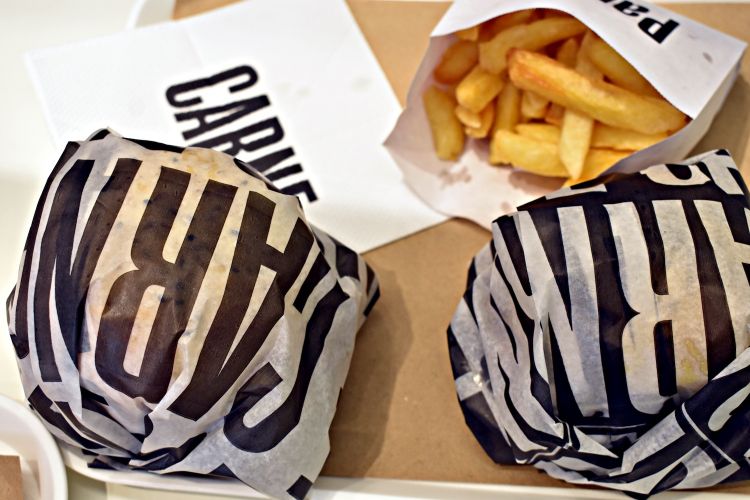
In 2017 CARNE received an award from Círculo de Creativos Argentinos for its packaging
He mentions data from the
Sociedad Rural Argentina, the
FAO, those of greenhouse gas emissions, he quotes the global history of breeding. The crucial issue, to sum it up, is not “what”, but “how”: it’s a question of promoting a return to pasture cattle. The “how” implies an obvious consequent reduction in the volumes produced: from the large numbers of the
feedlotindustrial breeding to the noble and healthy numbers of pasture cattle (which, among other things, as
Mauro points out, has a significant impact on the reduction of carbon dioxide). An unusual point of view compared to popular beliefs on the topic, but in which one cannot find any contradiction. In fact, one can notice awareness and a sense of responsibility.
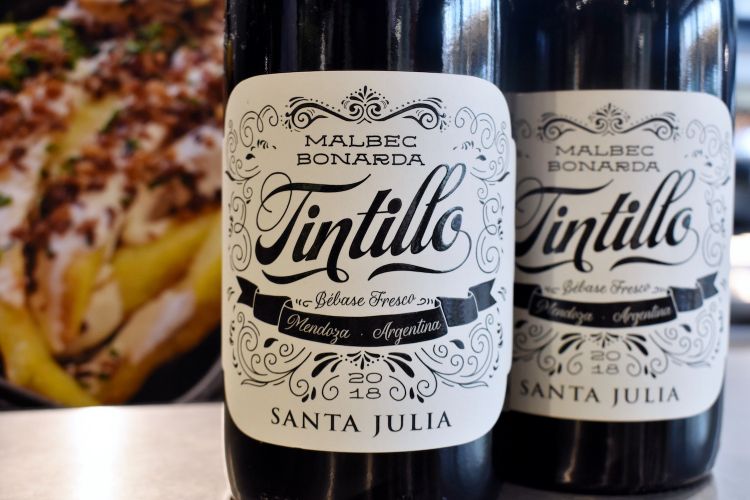
Tintillo - “to be drunk cold” - from Santa Julia, a historic winery owned by the Zuccardi family. Produced with carbon maceration, pressing the entire grapes with no destemming, it results in a fruity and fresh wine, with an excellent acidity (89 points from Parker for the 2016 harvest)
The Sense of Responsibility (which is the theme chosen for the Identità Milano 2020 congress) has found space for the first time this year in the Michelin Guide too: on top of the traditional stars, the red guide has given a special acknowledgement, in the shape of a five petal clover, to the places that stood out for their “praiseworthy environmental practices”. The goal, in the words of Gwendal Poullennec, the Guide’s international director, is to give visibility to these good examples and «make the entire sector, the clients and the population in general sensible to the topic».
Among the restaurants that received this acknowledgement - ça va sans dire – there’s Mirazur which, on top of this new “green star” has received the Plastic Free Certificationtoo, given by an Italian organisation, which acknowledge the restaurant plastic-free status and the fact that environmental sustainability is applied to the entire production process.

Plastic Free Certification: the first global brand (launched by a start up from Abruzzo) that certifies the removal of single-use plastic, the minimising of waste, the right recycling procedures, the environmental procedures of the entire production process. Mirazur is the first company in the world to get this certification
On the other side of the ocean,
CARNE’s restaurants have the same approach and successfully follow a plastic free policy: the glasses are made with glass, from recycled bottles of beer, a brilliant idea – following
Carolina Colagreco’s motto that “the best residue is the one you’re not making” – with a twofold environmental and social impact: the work to make the glasses from recycled bottles is handed to cooperatives of local workers; the straws can be reused and are made with a vegetal, ecological, and biodegradable material by
Bioconexiòn, in Yala, in the region of Jujuy, in the far North West of the country, offering qualified jobs to the local community.
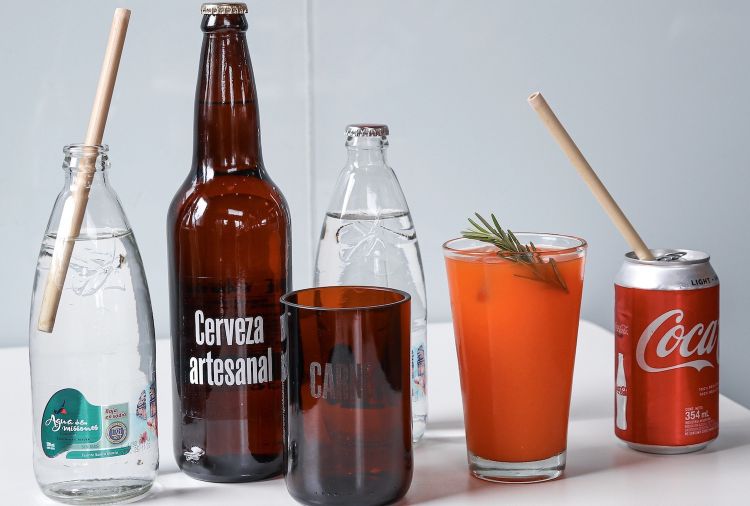
CARNE is a plastic free fast food. A great example: no plastic straws, plates, bottles or cutlery. The straws can be reused and are made with vegetal, ecologic and biodegradable materials by Bioconexiòn, in Yala, in the region of Jujuy, in the north west corner of the country. The glasses are made by recycling bottles of beer
A fast food where of course they don’t forget the pleasures of the good and the beautiful in life. At
CARNE the food is good: simple, genuine, tasty food, prepared with care, with a relaxed atmosphere, for a very reasonable price (around 15 euros for the “full” burger with fries – prepared with a system created by
Colagreco, which includes three steps so as to guarantee extreme crispiness, - salad of the day and artisanal beer) and a careful and smiling service that shows how the employees are at ease in their workplace.
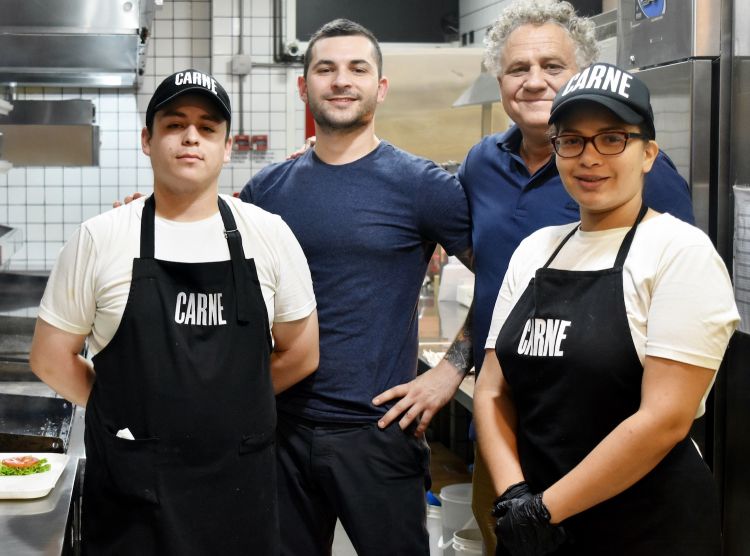
Rafaèl Lima, president at CARNE, with some of the staff. In the middle, Ezequiel Viqueira, ex Four Seasons, dining room director in Calle Defensa, in the centre of Buenos Aires
«Our employees have been working with us for years» Rafaél Lima, Mauro’s brother in law and the president at CARNE confirms. He explains in detail the company’s policies on contracts and labour unions and on constant training (even through a virtual academy), with a focus on motivation, sharing, and getting everyone in the team involved.
Good for the palate, for health, for the planet, for the environment, for the safeguarding of biodiversity, for society, local communities, employees, suppliers. It’s Colagreco, after all. We expected no less from someone who uses a quote by Ernesto Che Guevara for his brigade in the kitchen at Mirazur: “Seamos realistas, hagamos lo imposible” (“Let’s be realists, let’s do the impossible”). But without any naïf idealism, this approach translates into concrete and aware choices that result in the high quality of the food served at CARNE, in the name of simplicity, and with the ideal goal of promoting a change in the way food products are made. «Perhaps we’re just a drop in the sea – Rafaèl Lima told us – but the world can change through example and through changing ideas».
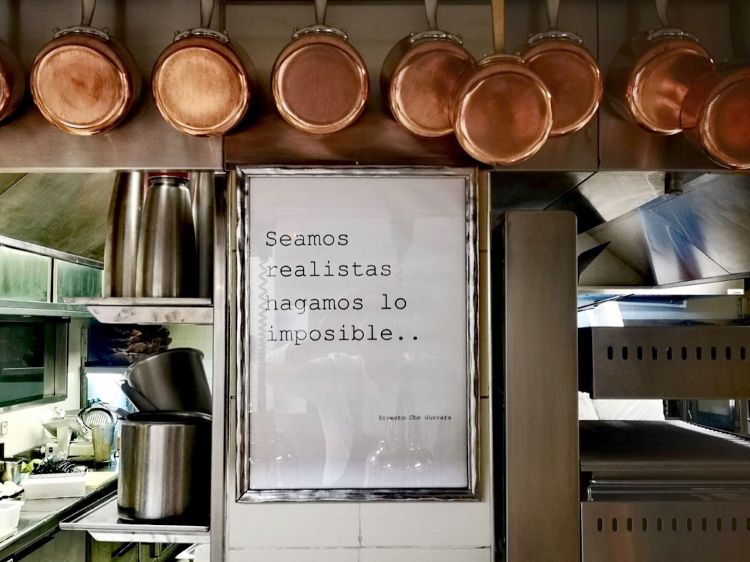
"Seamos realistas, hagamos lo imposible" (Let’s be realists, let’s make the impossible), a quote from Che, hanging on the wall in the kitchen at Mirazur. (courtesy of Luca Mattioli, sous chef)
The most beautiful definition of utopia, in my opinion, is the one erroneously attributed to Uruguayan writer Eduardo Galeano, but which should be attributed, as Galeano himself pointed out endless times, to the brilliant and talented Argentinian director Fernando Birri. «Utopia is on the horizon. I know very well I’ll never reach it: if I take ten steps, it will move ten steps further. The closer I get, the further it moves. So what’s the use of utopia? This is its use: it keeps us walking».
Walking in the right direction, trying to make a better world for our children, a commitment for which, by his own admission, Mauro Colagreco would like to be remembered one day.
Translated into English by Slawka G. Scarso